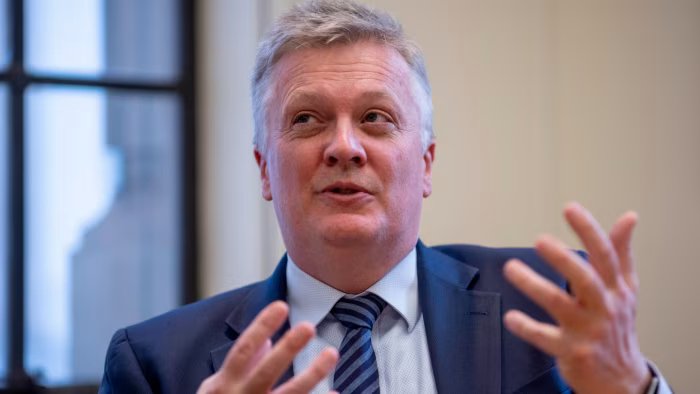Stay informed with free updates
Simply sign up to the UK inflation myFT Digest — delivered directly to your inbox.
Budget measures to cut household energy bills will not lead the Bank of England to lower interest rates if they are likely to have only a one-off effect on inflation, the bank’s chief economist has warned.
Huw Pill, speaking at an event in London on Tuesday, said that while he would not speculate on the policy changes chancellor Rachel Reeves might announce next week, it would be important for the Monetary Policy Committee to take the same approach as it had after last year’s Budget.
In particular, he argued, a policy to cut value added tax on household energy bills — one of the measures Labour MPs are keen to see in a package to bring down the cost of living — would have only a one-off effect on headline inflation, and “we ought to be thinking about how that washes out”.
Last year the chancellor announced an increase in employers’ national insurance and changes to regulated prices that had “one-off implications for headline inflation on the upside”, Pill said. But the BoE had not adopted tighter monetary policy in response because it believed the changes did not affect the “underlying dynamics” of disinflation.
Next Wednesday’s Budget might include changes “with implications for inflation on the downside” but “it is important that the monetary policy treats those things symmetrically,” Pill told a panel hosted by the investment bank Natixis.
Pill’s comments will damp hopes that Reeves’ promise to “tackle the cost of living” in her Budget will pave the way for earlier cuts in interest rates by the BoE.
Ministers have been debating a range of measures that could help to contain household bills in the short term, including cuts to VAT on energy bills, a further freeze to fuel duty and linking rail fare increases to the consumer price index rather than the retail price index, which tends to run at a faster pace.
But the government has now dropped plans to raise income tax rates — the measure economists saw as most likely to help quench inflationary pressures in the longer term.
Rob Wood, chief economist at the consultancy Pantheon Economics, said a substantial rise in income tax “was crucial to delivering a persistently deflationary Budget”. In its absence, other measures on energy bills or fuel duty might not be affordable and would in any case have only a temporary effect Wood argued, adding that “usually, rate-setters would look through price changes that drop out of the inflation index before the monetary-policy-relevant two-year horizon.”
Pill, one of the more hawkish voices on the MPC, voted last week with the majority of the committee to leave interest rates on hold at 4 per cent. He argued that a “cautious” approach to easing policy was needed because strength in service prices and wage growth suggested structural changes in the UK had led to “stronger intrinsic inflation persistence”.
The UK’s rate of inflation was 3.8 per cent in September, almost twice the BoE’s target of 2 per cent.
Pill said on Wednesday that given the continuing uncertainty about UK labour market data — with different indicators pointing in different directions — he wanted to see more conclusive evidence that headline inflation was falling sustainably back to target.
The data was “all over the place”, he said, but official figures showed wage growth was still too strong, given weak productivity growth.
“I personally draw the conclusion . . . that the current momentum in wages and price developments is still not fully compatible with the inflation target,” he said. “We are headed in that direction but there is still work to do.”

